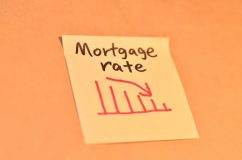By The Spy on
March 31, 2020
11:23 a.m. Update Notable Moves: The day’s top rate changes: BMO lowers its posted variable rates by 50 bps in line with the drop in prime: 3yr open: 4.65% to 4.15% 5yr closed: 3.45% to 2.95% HSBC improved these rates specials: 5yr fixed (refis): 2.79% to 2.69% 5yr fixed (high ratio): 2.49% to 2.39% 5yr variable (refis): 3.15% to 2.65%...
read more
By The Spy on
March 14, 2020
Prior to the last few days, consumers had expected falling Bank of Canada rates and lower bond yields to translate into cheaper mortgage rates. And they have, big-time. But these two benchmarks aren’t the only things that determine mortgage pricing. Borrowers were reminded this weekend that liquidity and credit risk are also in the equation. Ten days ago we noted...
read more
By The Spy on
March 12, 2020
Canada could see government interest rates below zero for the first time in history. That’s not a prediction, but it’s a real possibility. The probability of recession has surged from the coronavirus pandemic and oil market collapse. The Bank of Canada has just 125 basis points of rate-cutting left before it hits zero. That is insufficient ammunition to fight the...
read more
By The Spy on
March 7, 2020
Here’s the latest on mortgage rates following the maniacal once-or-twice-a-decade-type week we just had in the markets… Where Mortgage Rates Landed A quick look at this week’s major rate drops from the Big 6 banks: Prime Rate Banks slashed their prime rates on Thursday from 3.95% to 3.45%—the most since the credit crisis.That story. 5-Year Fixed Rates Typical big-bank unpublished...
read more
By The Spy on
February 25, 2020
One of the best short-term leading indicators of 5-year fixed mortgage rates is making a beeline towards a 2.5-year low. Canada’s 5-year swap rate is now just 1/10th of a percentage point away from this key threshold, which, if broken, will lead to further fixed-rate cuts. Banks routinely price fixed mortgages against swaps, which are interest rate derivatives used to...
read more
By The Spy on
February 13, 2020
There’s a big chunk of Canadians out there who: Dislike the mortgage renewal process Are risk averse, and Would gladly trade their stodgy old 5-year fixed term for something longer, if the economics made sense. Ten-year mortgages could fit the bill, if the rates weren’t as high. Knowing that, C.D. Howe issued areportlast month on how lenders might be able...
read more
By The Spy on
January 21, 2020
How much would you have to save to deal with a mortgage lender that had no in-person or telephone advisors, just ultra-low rates, live chat support and a reliable, efficient user experience? If you’re like 16% of mortgage shoppers, you wouldn’t deal with that kind of lender at all. If you’re like 18% of mortgage shoppers, you’d happily use an...
read more
By The Spy on
January 14, 2020
The 2020s won’t be the decade to lock into a long-term fixed mortgage, not if you believe RBC Economics. It’s projecting just 1.7% annual economic growth for the next 10 years, give or take. That’s roughly a full point less than before the Great Recession. At 1.7% GDP, there’s generally very little reason for rate hikes. Quite the opposite, RBC...
read more
By The Spy on
January 3, 2020
Here’s reason #5,369 why we don’t like to predict interest rates: war. Canada woke up this morning to the leader of Iran’s Revolutionary Guards’ Quds force being incinerated by a U.S. bomb. Iran’s Supreme Leader promised “severe retaliation” — whatever that means — and just like that, bond yields plunged. It was completely unpredictable. When global risk escalates, traders instinctively...
read more
By The Spy on
January 2, 2020
motusbank and Tangerinehave been putting the screws to HELOC competitors for months now. Their respective 3.75% and 3.85% HELOC rateshave undercut almost every lender in Canada since last spring. That’sfar longer than other lenders ever expected (or hoped). The more that consumers learn about these rates, the more it becomes an issue for the major banks. Reason being,HELOCs are usually...
read more
 log in
log in









